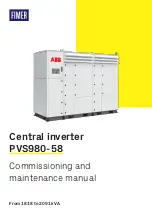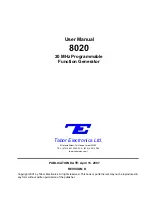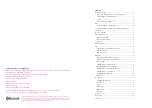
14
105056
BLUE-FLAME VENT-FREE PROPANE/LP AND
NATURAL GAS GREENHOUSE CO2 GENERATOR
TROUBLESHOOTING
Continued
WARNING ICON
G 001
WARNING: If you smell gas
• Shut off gas supply.
• Do not try to light any appliance.
• Do not touch any electrical switch; do not use any phone in your
building.
• Immediately call your gas supplier from a neighbor’s phone. Follow
the gas supplier’s instructions.
• If you cannot reach your gas supplier, call the fire department.
IMPORTANT:
Operating appliance where impurities in air exist may create odors.
Cleaning supplies, paint, paint remover, cigarette smoke, cements and glues, new carpet
or textiles, etc., create fumes. These fumes may mix with combustion air and create odors.
POSSIBLE CAUSE
1.
Metal expanding while heating or con-
tracting while cooling
1.
Appliance burning vapors from paint,
solvents, glues, etc. See
IMPORTANT
statement above
2.
Low fuel supply (Propane/LP Only)
3.
Gas leak.
See Warning statement
at top of page
1.
Not enough fresh air is available
2.
Low line pressure
3.
ODS/pilot is partially clogged
1.
Gas leak.
See Warning statement
at top of page
2.
Control valve defective
1.
Foreign matter between control valve
and burner
2.
Gas leak.
See Warning statement
at top of page
1.
Not enough combustion/ventilation air.
OBSERVED PROBLEM
Appliance produces a clicking/ticking noise
just after burner is lit or shut off
Appliance produces unwanted odors
Appliance shuts off in use (ODS operates)
Gas odor even when control knob is in OFF
position
Gas odor during combustion
Moisture/condensation noticed on windows
REMEDY
1.
This is common with most CO2 gen-
erators. If noise is excessive, contact
qualified service person
1.
Ventilate room. Stop using odor caus-
ing products while appliance is running
2.
Refill supply tank
3.
Locate and correct all leaks (see Check-
ing Gas Connections, page 9)
1.
Open window and/or door for ventilation
2.
Contact local gas company
3.
Clean ODS/pilot (see Cleaning and
Maintenance, page 11)
1.
Locate and correct all leaks (see Check-
ing Gas Connections, page 9)
2.
Replace control valve
1.
Take apart gas tubing and remove for-
eign matter
2.
Locate and correct all leaks (see Check-
ing Gas Connections, page 9)
1.
Refer to Air for Combustion and Venti-
lation requirements (page 3)




































